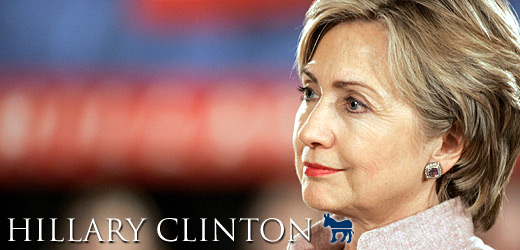
Background
Hometown Park Ridge, Ill.
Age 62
Religion United Methodist
Education Yale Law School, J.D., 1973 Wellesley College, B.A., 1969
Candidate Website www.hillaryclinton.com
Candidacy Status Formally declared candidacy Jan. 20, 2007. Suspended campaign and endorsed Barack Obama June 7, 2008.
Political Experience U.S. Senator from New York, 2001-present First Lady of the United States, 1993-2001 First Lady of Arkansas, 1979-1981, 1983-1993
Professional Experience Attorney, Rose Law Firm, 1976-1992 Faculty, University of Arkansas Law School, 1975 Counsel, House Judiciary Committee, 1974 Co-Founder, Arkansas Advocates for Children and Families
Family Information Spouse: Bill Clinton Children: Chelsea Clinton
Religious Biography
In Her Own Words
“I resolved at a very young age that I’d been blessed, and that I was called by my faith and by my upbringing to do what I could to give others the same opportunities and blessings that I took for granted. That’s what gets me up in the morning. That’s what motivates me in this campaign.” (Debate, Feb. 21, 2008)
The daughter of a Methodist Sunday school teacher, Hillary Clinton was raised in Park Ridge, Ill., attended Sunday school and vacation Bible school and was active in her church’s youth group. She is a lifelong member of the United Methodist Church, the country’s largest mainline Protestant denomination. After her marriage to Bill Clinton, a Southern Baptist, she taught Sunday school at First United Methodist in Little Rock, Ark. As First Lady, she regularly attended services atFoundry United Methodist Church in Washington.
In her autobiography Living History, Clinton describes her faith as a “crucial, though deeply personal, part of my life and my family’s life.” Clinton has said that even if she had not been taught by her family to pray, “after I’d been in the White House for a few months, I would have become a praying person.” She writes that her faith helped her in the days and weeks following the Monica Lewinsky scandal and President Clinton’s 1998 impeachment by the House of Representatives.
Clinton has cited her Methodist background as inspiration to promote faith-based initiatives and other programs aimed at social justice and child welfare. Clinton is currently a member of aSenate prayer group, which counts Republicans and Democrats among its members, including presidential candidate Sam Brownback.
On The Issues
Abortion Clinton says that “abortion should remain legal, but it needs to be safe and rare.” Abortion rights are protected by the Constitution, she has said, but the government should actively try to minimize the number of abortions through better sex education and improved access to birth control. While she believes that “the potential for life begins at conception,” she says that to outlaw abortion “would be an intrusion of government authority.” Clinton has praised religious groups for promoting abstinence. She opposed the Supreme Court’s March 2007 decision to uphold a ban on late-term abortions. Clinton says that, if elected president, she will “appoint judges to our courts who understand that Roe v. Wade isn’t just binding legal precedent, it is the touchstone of our reproductive freedom, the embodiment of our most fundamental rights.” Compare McCain and Obama
Church and State At an April 2008 candidates’ forum on faith and compassion, Clinton said that “we want religion to be in the public square. If you are a person of faith, you have a right and even an obligation to speak from that wellspring of your faith.” She also said that “our obligation as leaders in America is to make sure that any conversation about religion is inclusive and respectful.” In a 2005 speech, Clinton said that religious political officials should be able to “live out their faith in the public square.” During her 2000 U.S. Senate campaign, Clinton argued that allowing teachers to post the Ten Commandments in schools was a violation of the Constitution. Compare McCain and Obama
Death Penalty Clinton has been a longtime advocate of the death penalty. Clinton cosponsored the Innocence Protection Act of 2003 which became law in 2004 as part of the Justice for All Act. The bill provides funding for post-conviction DNA testing and establishes a DNA testing process for individuals sentenced to the death penalty under federal law. As first lady, she lobbied for President Clinton’s crime bill, which expanded the list of crimes subject to the federal death penalty. Compare McCain and Obama
Education Clinton opposes vouchers for private schools, instead favoring increased funding for public schools. She says voucher programs exacerbate divisions within communities, and could result in schools that are based on radical religious ideologies. When the Clintons were in the White House, they were criticized for sending daughter Chelsea to a private school while they advocated for public schools. Compare McCain and Obama
Environment To address global warming and dependence on foreign oil, Clinton says she wants to rely “on the old-fashioned idea of shared responsibility.” She proposes a “strategic energy fund” that would be created with oil-company profits to invest in developing and deploying alternative energy sources. She stipulates that by 2025, 25% of electricity should be produced by renewable energy sources. Clinton’s proposed energy plan involves a cap-and-trade system, which would cap emissions levels but allow companies to buy and sell emissions credits to offset costs. To conserve gasoline, Clinton advocates raising fleetwide fuel economy standards from the current level of 25 miles per gallon to 40 mpg in 2020 and 55 mpg in 2030. Clinton sits on the U.S. Senate Environment and Public Works Committee and co-sponsored the Climate Stewardship and Innovation Act of 2007 and the Global Warming Pollution Reduction Act in 2007. Compare McCain and Obama
Faith-Based Initiatives Clinton has articulated support for faith-based programs that address social ills and provide social services, adding that “there is no contradiction between support for faith-based initiatives and upholding our constitutional principles.” According to Clinton’s campaign director of faith-based outreach, Clinton wants to maintain a “fair and level playing field” for both faith-based and secular organizations that offer social services. Compare McCain and Obama
Gay Marriage Clinton opposes same-sex marriage but favors civil unions in which gay couples receive full recognition and benefits. She says that “marriage has always been province of the states” and advocates repeal of a provision in the Defense of Marriage Act that prohibits federal recognition of same-sex marriage. In the U.S. Senate, she opposed amending the Constitution to ban gay marriage. While she has solicited and received the support of gay and lesbian groups, many gay activists were alarmed over her March 2007 comment that the morality of homosexuality was up “to others to conclude.” She later released a statement saying that she does not believe homosexuality is immoral. In an April 2008 interview, Clinton said she would change federal tax policies and immigration laws to eliminate disparities affecting same-sex couples. Compare McCain and Obama
Health Care Clinton proposes a health care plan that she calls ”The American Health Choices Plan,” which would require all Americans to acquire health insurance. The plan would expand existing employer-provided health care, while also striving to provide more affordable opportunities for individuals to buy public or private insurance. Health care has been a signature issue for Clinton, who chaired the ultimately unsuccessful National Task Force for Health Care Reform while she was the first lady. She has called universal coverage “a moral and health imperative” and says that she hopes to make health care “the No. 1 voting issue in the 2008 election.” In the April 2007 Democratic debate, Clinton said that “we’ve got to control and decrease costs for everyone” and that the health care problem “is not just about the uninsured.” Compare McCain and Obama
Immigration Clinton supports comprehensive immigration reform based on strengthening America’s borders and implementing new enforcement laws. She advocates providing a path to legal status for undocumented workers already in the U.S. Clinton supports a proposal in New York state to allow undocumented, illegal immigrants to gain U.S. government identification, but she came under firefrom her Democratic opponents in an October 2007 debate for appearing to change positions on the issue. In the past, Clinton has used the Bible to criticize a Republican plan to make it a federal crime to offer aid to illegal immigrants, saying the proposed policy “is certainly not in keeping with my understanding of the Scripture because this bill would literally criminalize the Good Samaritan and probably even Jesus himself.” Compare McCain and Obama
Iraq War While she voted to authorize the use of force in Iraq in 2002, Clinton has since said that she “certainly wouldn’t have voted” for the war if she had known then what she knows now. She saysit is time to focus on “ending this war – not next year, not next month, but today” and hasdescribed the war as one “we cannot win.” If elected president, Clinton says she would use “the best military advice we can get” to begin to withdraw troops within 60 days of assuming office. She would also order “small elite strike forces to engage in targeted operations against al Qaeda in Iraq” and create a U.N.-led stabilization group to discuss strategies for rebuilding the country. Compare McCain and Obama
Poverty Reflecting on her “Judeo-Christian faith tradition” at an April 2008 candidates’ forum on faith and compassion, she said that “the incredible demands that God places on us, and that the prophets ask of us, and that Christ called us to respond to on behalf of the poor are unavoidable.” Clinton has said that as president she would appoint a cabinet-level “poverty czar” devoted to “ending poverty as we know it.” Clinton has said that the Bush administration turned the middle class into “invisible Americans” and says that if she is elected president “they will no longer be invisible.” In 2002 Clinton was criticized by liberal groups for supporting an increase in the work requirement for welfare; she said that she supported the measure because it was tied to $8 billion in funding of day care for welfare recipients. She advocated for welfare reform under her husband’s administration. As a U.S. senator, Clinton has voted for an increase in the federal minimum wage. Compare McCain and Obama
Stem Cell Research An outspoken supporter of stem cell research, Clinton cosponsored the Stem Cell Research Enhancement Act of 2005. President Bush vetoed the bill, which would have allowed federal financing of stem cell research on new embryonic stem cell lines derived from discarded human embryos originally created for fertility treatments. She has called the ethics of stem cell research “a delicate balancing act.” Compare McCain and Obama
